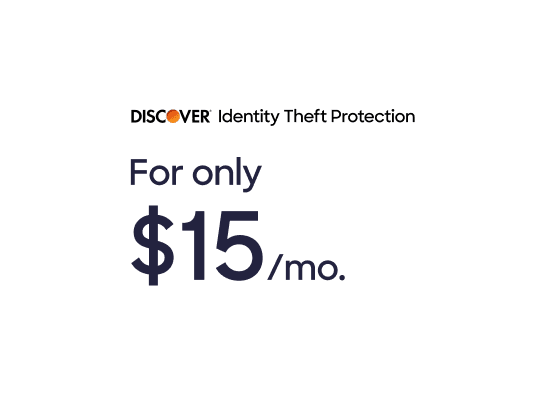While you don’t want an overstuffed wallet to weigh down your purse or pocket, you should make sure to carry what you need—like credit cards, ID, and emergency contact information—everywhere you go. Since what you choose to carry could impact how likely you are to have your personal info or your identity stolen, some things, like your Social Security card or a blank check, are better left at home.

What Should I Keep in My Wallet?
Key Points About: Things You Should Have in Your Wallet
-
You should only keep items you need in your wallet, like your driver’s license, credit and debit cards, and your health insurance card.
-
On the other hand, you should avoid carrying items like your Social Security card and your birth certificate with you unless you need other forms of ID.
-
It’s best to keep items like your passport and online passwords in a safe place at home.
Do you want to help protect your information from identity thieves?
Discover® Identity Theft Protection is a powerful option Discover cardmembers have to help protect their identity. Get more coverage with Identity Theft Protection. Just $15/month.
What to keep in your wallet
There are a few items that must go in your wallet, not only so you can have the money you need when you need it, but also to keep you safe in case of an emergency.
- Two credit cards: You may run into issues if you only keep one credit card with you. If there is a problem with your main card (like if you reached your spending limit or the store doesn’t accept that card) having a second credit card can come in handy. Even still, you don’t want to carry too many credit cards with you. If your wallet gets stolen, only having to report the theft of only two cards to the FTC can save you time and stress compared to reporting the theft of multiple credit cards. If you own more than two cards, you should leave the extras at home unless you plan to use one of them.
- Cash: You likely use your credit or debit cards for most purchases, but it can be helpful to carry a bit of cash too. You might have to make a cash purchase and it’s good to be prepared so you don’t get stuck trying to find an ATM.
- Debit card: Not only can you use your debit card to make purchases, but you can also use it to get cash at an ATM. If you need cash fast, a debit card is the way to go—cash advances on your credit card typically charge higher fees.
- Current ID: So many places call for ID, it just makes sense to always keep it in your wallet. From driving to checking into a doctor’s office and more, you’ll need an ID card. Any ID you keep with you should be up to date with your current address and photo.
- Emergency contact info: You should keep a card in your wallet with your phone number (so if someone finds your lost wallet, they can call you). On the card, you should also jot down the contact information of a friend or relative who could help in an emergency. If you have severe allergies or a health condition that medical workers should know about, include that on the card as well. This important information could save your life.
- Insurance cards: Don’t leave home without your health and auto insurance cards, as you may need this information in the event of an emergency.
What to leave at home
If your wallet gets stolen, you don’t want an identity thief taking your information, so it’s best you leave some things at home. Here is a list of things you probably shouldn’t keep in your wallet on a regular basis:
- Social Security card, birth certificate or passport: Sometimes you might need these items when you travel or must show multiple forms of ID—but once you no longer need them, keep them at home in a safe place. If someone steals your wallet while this information is in them, they may also try to steal your identity too.
- Spare house key: If you keep an ID with your address on it plus a spare key in your wallet, because if found (or stolen) together, they make it easier for thieves locate and enter your home. If you worry about losing your keys, it’s much safer to leave a copy with a trusted friend or neighbor.
- A list of your passwords: Don’t make it easy for thieves to spend your money at online stores, or worse, have access to your banking account logins. If you feel you need to keep a written record of your passwords, store them in safe place and don’t carry them with you.
Safeguarding your identity and personal information
What you choose to carry in your wallet can make you more prone to become a victim of identity theft or other types of fraud. Remember to only carry what you need. You should avoid keeping unnecessary items in your wallet. Instead, you should stick with only essential items like your driver’s license, credit cards, debit cards, and health insurance cards. Learn more about how you can protect yourself from identity fraud.
Next steps


See rates, rewards and other info
You may also be interested in
Was this article helpful?
Was this article helpful?
-
Legal Disclaimer: This site is for educational purposes and is not a substitute for professional advice. The material on this site is not intended to provide legal, investment, or financial advice and does not indicate the availability of any Discover product or service. It does not guarantee that Discover offers or endorses a product or service. For specific advice about your unique circumstances, you may wish to consult a qualified professional.


